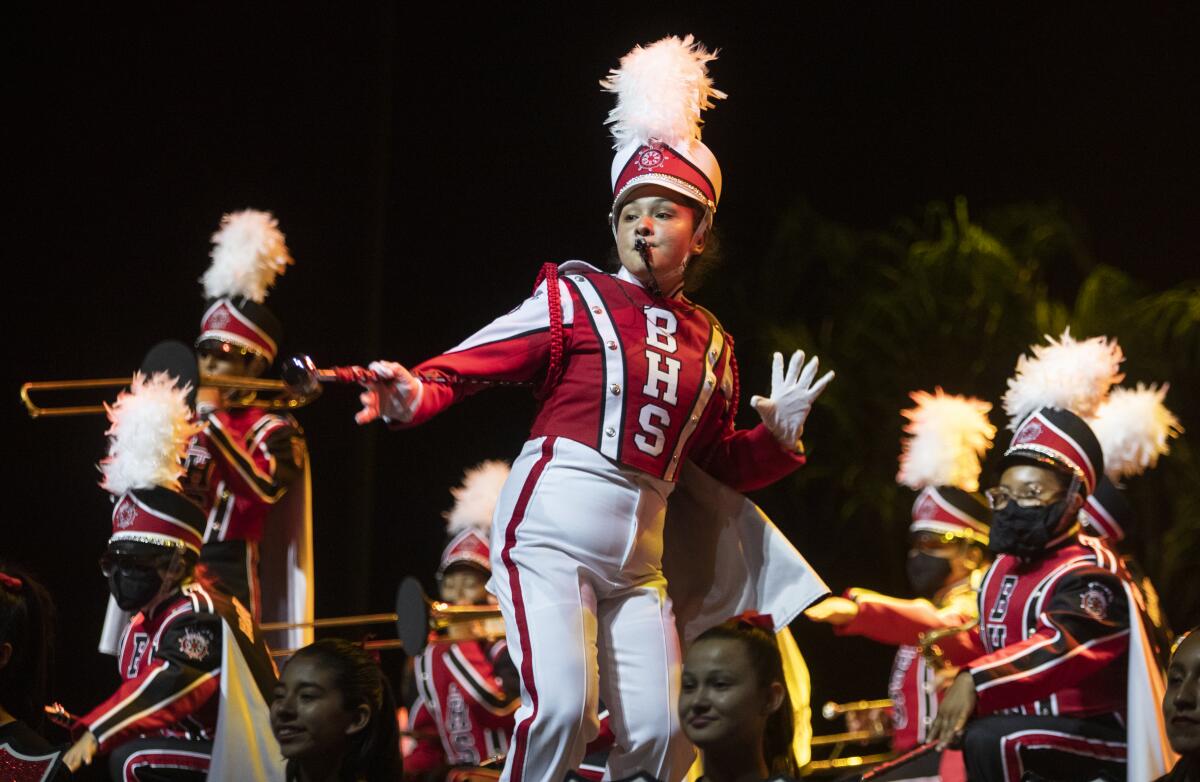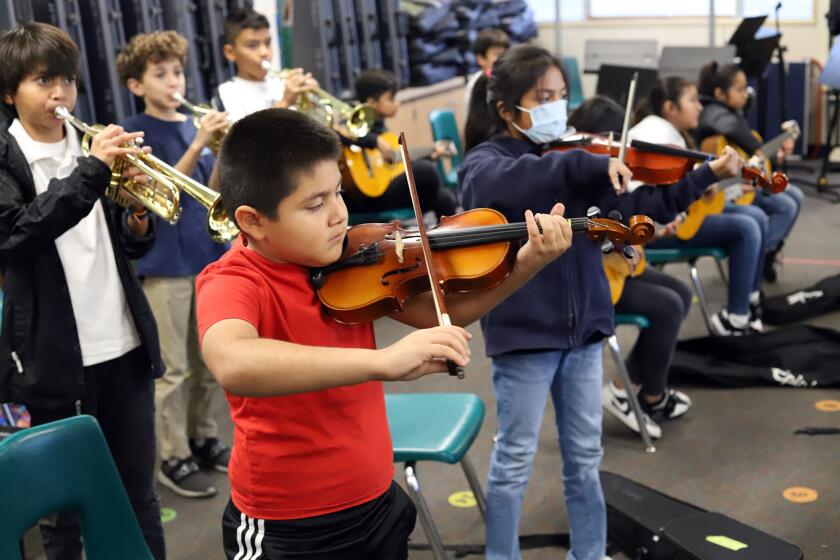LAUSD is violating the law on arts education spending, former Supt. Beutner and unions allege

An alliance that includes labor unions, parents and former Los Angeles schools Supt. Austin Beutner has accused L.A. Unified of violating a voter-approved state law designed to increase spending for arts instruction and is calling on the Board of Education to reject an internal report sanctioning the district’s handling of the funds.
In a 10-page analysis sent Tuesday morning to the Board of Education, Beutner’s coalition — which includes the labor representatives of most district employees — documented alleged misspending at 14 schools and suggested their research represents a small sample of what they believe is widespread misuse of the arts funding.
At issue is $77 million in state funds allotted to the district thanks to voter-approved Proposition 28, which requires schools to use their share of the money to increase arts instruction.
The alliance accuses the district of using the new arts money to replace existing funding on arts instruction. The result, they allege, is that the district saves money for other purposes without increasing arts instruction at every school by as much as the law requires.
“L.A. Unified has chosen to violate both the letter and spirit of the law and students are suffering as a result,” the coalition’s analysis states. “Knowingly violating the law is wrong. Beyond that, it’s morally bankrupt for District Leadership to tell some families in effect, ‘Yes, Prop. 28 gives us the money to provide your child with an arts education, but we are not going to do so.’”
District officials have denied wrongdoing. They said overall spending for arts education has increased even beyond the dollars provided through Proposition 28.
Proposition 28 directs nearly $1 billion to expand arts and music classes at California schools. But critics say some districts, including LAUSD, are using the budget bonanza for other things.
L.A. Unified officials are relying on an interpretation of the state law that differs sharply from that of Beutner, Proposition 28’s author. Beutner says arts education spending must increase at every school in the district. The district says its compliance with Proposition 28 is based on higher systemwide spending on arts. What qualifies to be counted as arts instruction also is in dispute.
“While school-level funding may vary, on average, our schools saw an $82,000 increase in their total arts budget since the previous school year,” according to the district staff report prepared for Tuesday’s meeting. “Proposition 28 stipulates that funds be used to increase funding of arts education programs within school districts. While this may differ school-to-school, the law assesses the overall expenditures and investments at the District level.”
State officials have not weighed in on the dispute, focusing instead on helping school systems understand the rules.
In their letter, coalition members admonished the Board of Education:
“Teachers, school staff and families have repeatedly shared their concerns. ... In the absence of a proper and transparent discussion by the Board, we are compelled to remind you what the law requires and compare that with what is actually happening in schools.”
District administrators included a caution of their own in the legally required report: “If the Board of Education does not approve this annual report, Proposition 28 funds may be delayed or withheld for the 2024-2025 school year.”
Beutner’s coalition includes the leaders of the school system’s two largest unions — United Teachers Los Angeles and Local 99 of the Service Employees International Union, which represents the largest number of nonteaching workers, including bus drivers, custodians, cafeteria workers and teacher aides. Also signing on was Teamsters Local 572 and California School Employees Assn. Chapter 500.
Under Proposition 28, each school is empowered to decide how best to enhance arts programs. The windfall is drawn from the state’s general fund — at an amount equal to 1% of all money spent on schools serving students in transitional kindergarten through 12th grade. Thus the money is ongoing and will generally increase each year.
The hope is that a ban on student cellphone use will improve academic achievement and reduce anxiety, fights and bullying.
One part of the coalition analysis looked at arts-instruction spending at 12 schools, comparing budgets before and after Proposition 28 money arrived for the 2023-24 school year. Nine of the schools had exactly the same amount of arts instruction before and after.
Rosewood Elementary in Beverly Grove, for example, had the equivalent of an arts teacher two days a week both before and after the Proposition 28 boost.
Three of the 12 schools had an increase in arts instruction.
Serrania Elementary in Woodland Hills, for instance, went from having an arts teacher for three days a week to four days a week. But the coalition calculates the school’s Proposition 28 entitlement at over $80,000, which should have paid for more, they said, especially given its enrollment increase from 493 to 562.
The analysis looked at a few school budgets in greater detail. At Walgrove Elementary in Mar Vista and Warner Elementary in Westwood, the district’s contribution to arts instruction was zeroed out and replaced with Proposition 28 dollars, according to the analysis.
The research on these schools was compiled with the collaboration of involved parents who pressed for specific public information about their school’s budget. But obtaining and decoding the budgets involved persistence, said Nicolle Fefferman, a parent and teacher who helped organize the effort.
At Tuesday’s meeting, a staff presentation that accompanied the district’s report indicated that L.A. Unified hired 247 additional arts instructors for the school year that just ended. This included fully credentialed teachers and lower salaried non-teachers and teacher aides.
This compares to $76.7 million in new, ongoing Prop. 28 funding that the district received. School systems have the latitude to delay spending while setting up their arts programs.
The district’s report also adds in a total figure for funding spent as part of a “Cultural Arts Passport” program. Passport funds are commonly spent on field trips.
These field trips, including to the zoo and sports events, are positives for students — but are not necessarily arts related. Nor do they represent the actual instruction in the arts envisioned by the proposition, according to parents and the union coalition.
In response to critics, L.A. schools Supt. Alberto Carvalho recently announced that he would adjust the budgets for next year at some schools — but not because the district had previously done anything improper.
Beutner wrote Proposition 28 after he left L.A. Unified in June 2021 and voters subsequently approved the ballot measure in November 2022 by a nearly two-thirds margin. Students were to begin to benefit in the school year that just concluded.
The text of Proposition 28 points to research that the overwhelming majority of public schools “fail to provide a high-quality course of study across arts disciplines” and that “access to arts education is worse for high-poverty schools,” adding that “the cause of the steady decline in arts and music education is directly linked to inadequate and unstable funding of such programs.”













